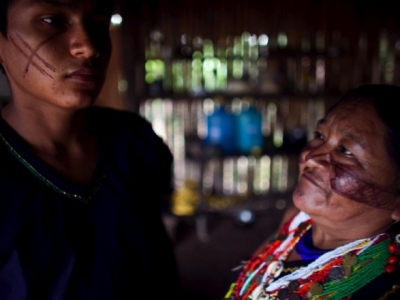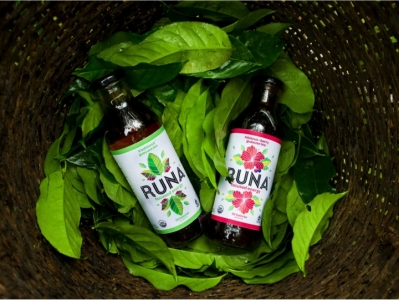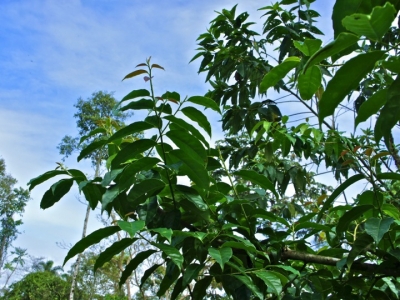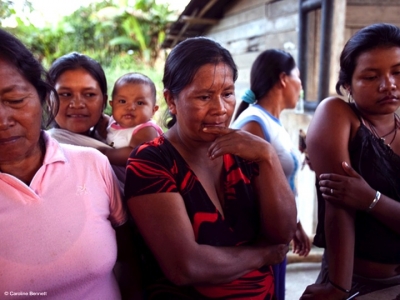In the Ecuadorian Amazon, the Kichwa people wake up before dawn with their families to drink a caffeinated infusion of boiled leaves from the guayusa tree (Ilex guayusa). They discuss the lessons from their dreams and use them to plan for the day ahead.
This tree has great cultural significance for the Kichwa and most families have at least one guayusa tree near their home. Traditionally, a newly married woman brings a cutting of the guayusa from her childhood home to plant at her new home with her husband and her future family.
 Indigenous Kichwas in traditional dress. Photo: RUNA
Indigenous Kichwas in traditional dress. Photo: RUNA
The Ecuadorian Amazon is one of the most biodiverse places in the world and historically it has seen lower rates of deforestation than the Ecuadorian coastal forests and neighboring Peru and Brazil due to a general policy of isolation up until the 1970s. In recent years, oil exploration, clear-cutting forest for agriculture and unsustainable timber extraction is threatening this biodiverse landscape in unprecedented ways. The indigenous people of the Amazon are poor and have few options for generating income in their forest communities and almost none are environmentally sustainable, despite the way they have traditionally lived in the rainforest for generations.
The agroforestry systems of the indigenous farmers in the Ecuadorian Amazon are diverse farms of generally less than five hectares with timber species, fruit trees, medicinal plants, subsistence and cash crops. In most cases the whole family works on the farm, or chacra. Men usually tend to the timber and cash crops, while women tend to fruit trees, medicinal plants and subsistence crops. In some families where the men work outside of the community, the women, grandparents and children manage the entire chacra, while the fathers and older brothers are away. Farmers are quite often ill-informed about market prices and are not able to negotiate for fair prices for their timber and cash crops like cacao and coffee. These remote areas populated by indigenous people are under the threat of deforestation and lack of sustainable economic opportunity.
RUNA, a social business where I currently work as a Director of Evaluation and Development, was founded in 2009 with a dream of creating value for tropical forests that benefit local people and forest ecosystems. We have built a value chain for organic guayusa production with 3000 producers that are certified by Fair Trade USA and we sell guayusa-based teas and energy drinks in 7000 stores in North and South America. At the beginning, one of the founders traveled around Napo Province on a motorcycle visiting Kichwa communities and asking them to sell guayusa, a product primarily for family consumption, with a very limited local market. The farmers were incredulous, why did this tall, blonde American want to buy guayusa? Thankfully, he convinced them and in the last five years, the market for this new product has grown exponentially. We are working to ensure that this growth is environmentally sustainable and beneficial for producers.
 RUNA bottled beverages. Photo: RUNA.
RUNA bottled beverages. Photo: RUNA.
Guayusa is native to the Western Amazon and is one of hundreds of Ilex species in the Americas (other examples include holly and yerba mate). These trees are shade-tolerant, pest resistant, readily adaptable perennial crops that are currently cultivated in agroforestry systems. Guayusa is most common in the Ecuadorian Amazon but also exists in Peru and Colombia. It can be kept as a leafy bush but it can also grow up to 20 meters if left unpruned. The trees rarely flower and as far as we know, the plant does not reproduce sexually; indigenous populations of the Amazon have cloned guayusa for so long that it may only reproduce in this way. Its leaves contain high concentrations of caffeine and antioxidants. When brewed from a tea bag, guayusa has 90mg of caffeine and in the more concentrated guayusa bottled beverage, it has 120mg of caffeine, which is the same as a cup of coffee. It has 60% higher antioxidant content than green tea.
 Guayusa tree. Photo: RUNA.
Guayusa tree. Photo: RUNA.
At RUNA we have taken several steps to ensure that this crop remains in agroforestry systems and is managed in a way that respects the biodiversity of the Amazon. First, and perhaps most importantly, we created a research program with Yale University and Dr. Florencia Montagnini to investigate how guayusa production can be sustainably scaled up in agroforestry systems. In this research program we collaborate with both researchers and indigenous producers to identify sustainable best practices. Recently we published a Guayusa Best Practices Manual and a Compendium of Technical Information, based on our research, to share information with farmers and other public and private institutions. These publications have been disseminated through our network of stakeholders in the region. We have also presented at several international conferences and have papers pending publication on a variety of guayusa-related topics. Our local field technicians and internal organic inspectors visit each producer in their chacra and also provide community technical trainings for new farming techniques. Finally, almost 1,000,000 trees, both guayusa and timber species, have been planted in producer chacras.
 Women guayusa producers at a community meeting. Photo: C. Bennett.
Women guayusa producers at a community meeting. Photo: C. Bennett.
We also work to guarantee that the value chain is inclusive and fair for indigenous smallholder producers. We are certified by Fair Trade USA since 2011 and we work with nascent producer organizations to build capacity and financial literacy. RUNA pays a fair and stable price for guayusa leaves and also pays a social premium into a fund that producers use for community development projects. Three producer associations are now legalized and executing projects for their members and several others are following suit. In 2014 alone, producers will be paid over USD$225,000 for guayusa sales and over USD$33,000 in social premium payments. This is just the beginning of what we envision as a new sustainable alternative to extractive industry and destructive mono-cropping in the Amazon.
RUNA plans to continue on this path, fulfilling our dream of creating value for tropical forests, with new products in agroforestry systems, and generating unquestionable benefits to local people and forest ecosystems.
Aliana Piñeiro (M.A. International Affairs, The New School ’12) is the Director of Evaluation and Development at Runa Foundation. She spent several years honing her analytical skills in finance in New York City, before following her calling in international development. She wrote her thesis on Fair Trade certification of guayusa and she joined the team in Ecuador as the Director of Monitoring and Evaluation in 2012. In her current role she continues to direct Runa’s M&E in the Amazon and also works to expand our sources of financing and grow our network internationally. Aliana currently lives in New York, NY with her husband and their dog.